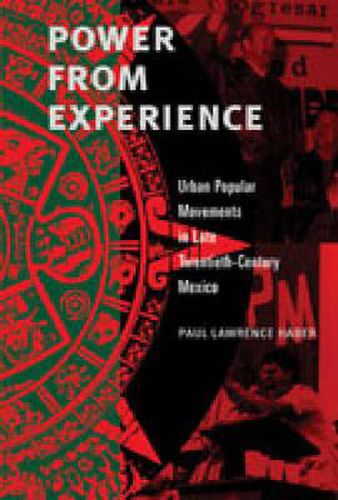Readings Newsletter
Become a Readings Member to make your shopping experience even easier.
Sign in or sign up for free!
You’re not far away from qualifying for FREE standard shipping within Australia
You’ve qualified for FREE standard shipping within Australia
The cart is loading…






When Vicente Fox was elected Mexico’s president in 2000, the world’s most enduring twentieth-century authoritarian regime finally came to an end. In this book Paul Haber explains how urban popular movements contributed to such a historic transition. In the 1960s Mexico’s urban poor, effectively incorporated into institutionalized forms of clientelism and cooptation, were perceived as passive and acquiescent. Their situation changed during the 1970s, Haber shows, as popular movements-led largely by young people inspired by the revolutionary ideals of Mexico’s 1960s student movement-took the first steps toward mobilizing the urban poor in what would develop into the full-scale political protests of the 1980s. When Mexico’s economic crisis came in the early 1980s, urban popular movements were in a position to play a major role in the growing democratic opposition. Haber, using a creative blend of ethnography and policy analysis, traces this history on a national level and with detailed reference to two key organizations, the Comite de Defensa Popular of Durango and the Asamblea de Barrios of Mexico City. In the late 1980s and early 1990s, many of Mexico’s most important social leaders saw new opportunities in electoral politics, and the transformation from social movement to party politics began. Haber’s study closely follows the urban dimensions of this history and spells out its implications not only for the urban poor but also for Mexico’s nascent democracy.
$9.00 standard shipping within Australia
FREE standard shipping within Australia for orders over $100.00
Express & International shipping calculated at checkout
When Vicente Fox was elected Mexico’s president in 2000, the world’s most enduring twentieth-century authoritarian regime finally came to an end. In this book Paul Haber explains how urban popular movements contributed to such a historic transition. In the 1960s Mexico’s urban poor, effectively incorporated into institutionalized forms of clientelism and cooptation, were perceived as passive and acquiescent. Their situation changed during the 1970s, Haber shows, as popular movements-led largely by young people inspired by the revolutionary ideals of Mexico’s 1960s student movement-took the first steps toward mobilizing the urban poor in what would develop into the full-scale political protests of the 1980s. When Mexico’s economic crisis came in the early 1980s, urban popular movements were in a position to play a major role in the growing democratic opposition. Haber, using a creative blend of ethnography and policy analysis, traces this history on a national level and with detailed reference to two key organizations, the Comite de Defensa Popular of Durango and the Asamblea de Barrios of Mexico City. In the late 1980s and early 1990s, many of Mexico’s most important social leaders saw new opportunities in electoral politics, and the transformation from social movement to party politics began. Haber’s study closely follows the urban dimensions of this history and spells out its implications not only for the urban poor but also for Mexico’s nascent democracy.